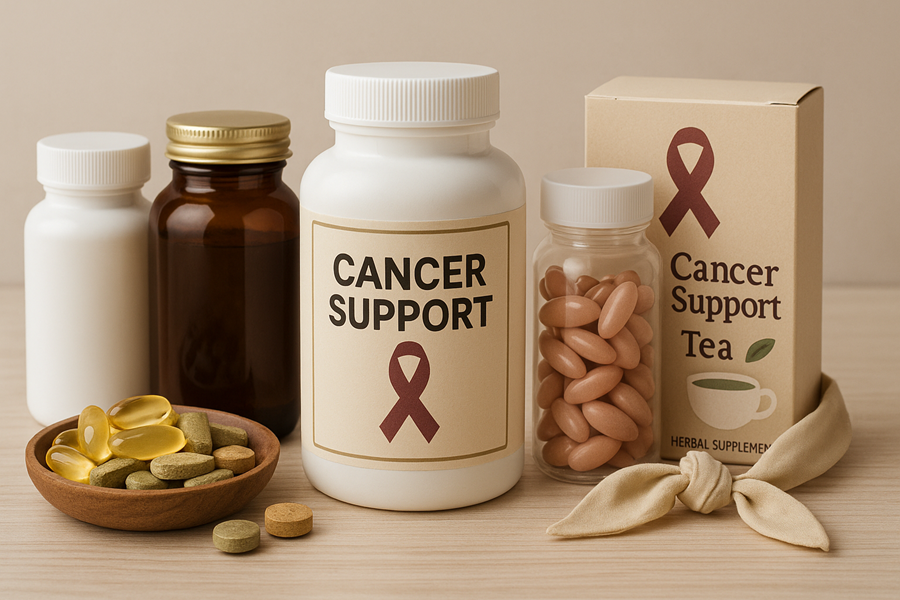Are Natural Supplements for Cancer Support Backed by Science? A Breakdown of Clinical Studies
- Jack Thomas
- Aug 21
- 4 min read

Hey there, dear reader! Ever found yourself scrolling through article after article, feeling like natural products and cancer support products are being promised as miracle helpers? You’re not alone. In Canada, and all around the globe, there's growing curiosity about whether natural supplements for cancer support hold water—or are just smart marketing.
Today, we're unpacking the real deal with a friendly walk through the science, the stories, and how your brand, Physicians Research, fits into this conversation. Let’s get curious—but also clear-eyed.
Storytime: From Hype to Hope
Picture this: Anna, a busy professional from Vancouver, hears about a "nature-based supplement" that claims to ease chemotherapy side effects. She's intrigued, hopeful—but also cautious. She’s heard conflicting advice, worried about safety, interactions, and whether these health supplements Canada shops are simply cashing in on fear. That question—“Are natural supplements for cancer support backed by science?”— is one we’re tackling head on today.
What Does Science Say?
1. Managing Side Effects—Some Promising Signs
Oral Glutamine: A systematic review by the MASCC/ISOO (Multinational Association of Supportive Care in Cancer / International Society of Oral Oncology) found that oral glutamine may help manage oral mucositis (painful mouth sores) in head and neck cancer patients undergoing radiotherapy + chemo. That’s a hopeful “Suggestion in favor.” But—and this matters‑‑they found no benefit for glutamine in stem‑cell transplant patients, and reversed previous guidelines for zinc.
Vitamin D, Probiotics, Fish Oil, L-Glutamine, and Ginseng: A CancerCenter.org article highlights these supplements as potentially useful in alleviating side effects like fatigue, mouth sores, digestive issues, joint pain, and more.
2. Cancer Prevention or Treatment? Not So Fast...
The American Cancer Society, AICR, and other expert bodies have concluded that dietary or nutritional supplements do not reliably prevent, cure, or control cancer growth.
A 2012 review noted that observational studies linking multivitamins to lower cancer risk are weak, and there have been no solid randomized controlled trials to support multivitamin use—a reminder to tread carefully.
The much-publicized SELECT trial (Selenium and Vitamin E Cancer Prevention Trial), which included participants in the U.S., Puerto Rico, and Canada, revealed no protective effect against prostate cancer—and even raised concerns that vitamin E might increase risk.
Selenium's effects remain inconsistent across studies, with no convincing evidence supporting its use to prevent cancer.
3. Herbal/Botanical Supplements—Lots of Hype, Less Evidence
Medicinal mushrooms such as Turkey Tail, Reishi, Chaga, Cordyceps, and Maitake are trending—and research shows they contain potentially immune-supporting compounds like beta-glucans and antioxidants.
For instance, Turkey Tail has compounds (like PSK and PSP) that may enhance immune function and support cancer treatment, specifically in breast, lung, and colorectal cancers—but findings are preliminary.
Turmeric / Curcumin: A powerful anti-inflammatory and antioxidant—but while curcumin looks promising, absorption is a challenge, and more high-quality trials are needed.
Other compounds like Honokiol, Silibinin, Indole‑3‑carbinol, and AHCC (from Shiitake mushrooms) show lab- and animal‑level anticancer activity—some via apoptosis or immune modulation—but human evidence remains scarce or early stage.
4. Dietary Patterns Matter More Than Pills
A systematic analysis found that consuming cruciferous vegetables like broccoli, cabbage, kale—just 40–60g per day—may reduce colorectal cancer risk by ~20–26%. That's a real, food-based impact.
And Vitamin D keeps popping up. A huge review of over 1.3 million people linked sufficient levels to better outcomes in colorectal cancer—though dosage, context, and further trials still matter.
Busting Myths, Clarifying Facts
Myth | Reality |
Supplements can cure or prevent cancer. | No—current evidence doesn’t support this for most supplements. |
"Natural" means harmless. | Not necessarily—interactions, side effects, and variable quality are real concerns. |
If it’s trending, it's proven. | Trendy products like medicinal mushrooms or curcumin still need more human studies. |
Food-based nutrients work better. | Evidence supports cancer risk reduction through whole-food diets, especially veggies and balanced nutrition. |
What This Means for Physicians Research in Canada
Your brand, Physicians Research, stands at a unique intersection: trusted, research-oriented, and focused on Canadians. Here's how you can shine:
Stay evidence-led: Promote products like oral glutamine (for specific chemo side effects) and vitamin D in cases of deficiency—highlighting that recommendation is “adjunctive,” not curative.
Prioritize safety and transparency: Offer third-party–tested formulations, clear dosage guidelines, and easy-to-understand disclaimers that a supplement is not a treatment—especially in the context of cancer.
Bridge products and education: Share stories, FAQs, and even mini-interviews with healthcare professionals in Canada—explaining why some mushrooms or curcumin are popular, what studies currently show, and what remains unknown.
Encourage whole-food strategies: Complement your product lineup with educational resources that promote vegetable-rich, vitamin D–friendly Canadian diets, maybe even a simple “broccoli-plus source” recipe tie-in.
Champion dialogue with healthcare teams: Encourage Canadians using cancer support products to talk openly with their oncologists or medical team to ensure safety and context.
Wrapping Up with Heart and Honesty
Here’s the most important takeaway:
Natural supplements can offer value—especially for managing side effects—but they are not magic bullets. The strongest science supports specific uses like oral glutamine for mouth sores and vitamin D when there’s a deficiency.
Prevention or cure? Not backed by solid evidence. Supplements like multivitamins, selenium, and vitamin E have not proven effective—and sometimes even pose risks.
Botanicals are exciting—but early. Medicinal mushrooms, turmeric, and other botanicals show potential—but research in humans is still catching up.
Whole foods win for prevention. There’s strong evidence that simple, veggie-rich diets—especially with cruciferous vegetables—lower cancer risk.
Final Thought for the Canadian Reader
If you're exploring supplements for Health supplements Canada, especially through a reputable source like Physicians Research, remember: knowledge is your best ally. Use carefully researched products, talk to your healthcare team, and don’t forget the power of a balanced plate.
By embracing clarity, empathy, and evidence, you’re not just a consumer—you’re an empowered advocate for your own health. And that’s a beautiful place to be.







Comments